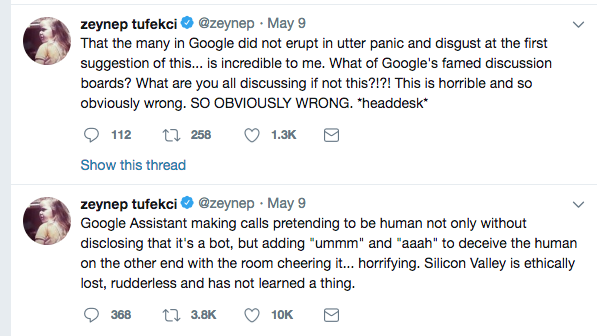You have /5 articles left.
Sign up for a free account or log in.
If you have not already, I recommend taking 4 minutes and 11 seconds to watch the Google Duplex demo:
Your first reaction after watching this demo is probably in line with professor Tufekci’s. Right? Mine was.
A few things to be said about Google Duplex.
First, it is great that an academic - Zeynep Tufekci - is setting the tone for this debate. I’m not a big fan of Twitter, but in times like these I see the potential for the platform. Tufekci’s tweets were so timely, raw, and obviously true that they instantly shifted how many of us see this technology.
Once we get over Google’s boneheaded failure to clearly indicate that the calls were originating from a computer, can we take a step back and try to think about the implications of this technology?
What Google is demonstrating with Duplex is the ability of AI (artificial intelligence) to have conversations. Right now, these conversations are limited. Duplex will be able to call and make a dinner reservation or a styling appointment, but it is not clear what else the technology will be able to do.
The current generation of personal digital voice assistants - Apple’s Siri and Amazon’s Alexa and Google's Assistant and Microsoft’s Cortana - are just not all that useful. They seem like a technology in search of a problem to solve.
As far as I can tell, digital assistants have had no impact on higher ed. This is not a technology that seems to matter to academia.
There is great interest in higher ed, however, for AI.
Look no further than the Georgia Tech report from its Commission on Creating the Next in Education: Deliberate Innovation, Lifetime Education. Initiative 4, Artificial Intelligence and Personalization, describes the “Jill” Watson virtual teaching assistant experiment:
"In 2017, Georgia Tech began its third semester using virtual teaching assistants (TAs) in an online course, a year after “Jill Watson” was introduced in the class on Knowledge Based Artificial Intelligence, a core course taught by Professor Ashok Goel as part of the Online Master of Science in Computer Science degree program.
“Jill,” originally implemented on IBM’s Watson platform, answers frequently asked questions without the help of humans. In spring 2016, the students didn’t realize her identity until they were told on the final day of the class.
But for all her success, “Jill” is a question-and- answer tutor. The opportunity now exists to augment “Jill’s” skills to handle other tasks that are associated with personalized learning, allowing advisors to go beyond scheduling and keeping students on the path of timely completion of degrees to become powerful partners in learning.
...Such a system must be able to answer questions effectively and with a human touch. The system must also help design formative assessments, be a cognitive tutor, and provide metacognitive tutoring capabilities. The development of such a tutor will require advances in human-centered AI and the ability to apply it to specific domains.
In the near term, AI-based platforms for mastery learning, which have been tested across subject matter and student populations for more than thirty five years, can be married to online and adaptive learning platforms. These platforms, due to their ability to provide flexible learning, remove time as a critical variable to learning. Georgia Tech will explore these effective learning methodologies to raise general levels of achievement to those normally associated with the upper 10 percent of learners.”
It is hard not to watch the Google Duplex demo and think of what Georgia Tech would do if they got their hands on this technology.
The Georgia Tech Jill Watson virtual teaching assistant experiment also raises interesting questions along the lines of our reaction to Google Duplex. What do we make of the fact that "In spring 2016, the students didn’t realize her identity until they were told on the final day of the class."? How is this different from Google Duplex not identifying itself as an AI on its calls?
I have no idea if Google is engaging higher ed around Google Duplex. Does anybody know? I hope they are.
Getting academia involved in the development of Duplex would help Google with both the messaging around the technology, and the eventual utility of the AI.
Does what is going on at Georgia Tech also influence you in how you see Google Duplex?
What do you make of Georgia Tech’s idea that students would benefit from a virtual teaching assistant?
Will AI powered teaching assistants become as unremarkable in the higher ed of tomorrow as other invisible technologies, such as e-mail and WiFi?
Does Google Duplex change your thinking about the time horizon in which truly useful virtual teaching assistants will be a reality?
Were you horrified, excited, or a bit of both when you learned about Google Duplex?





